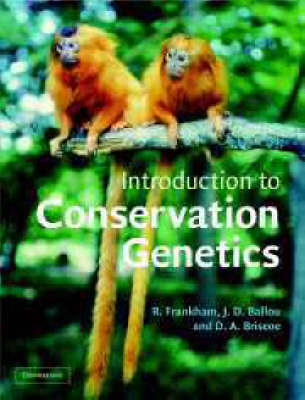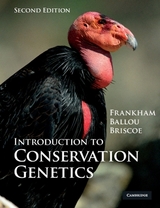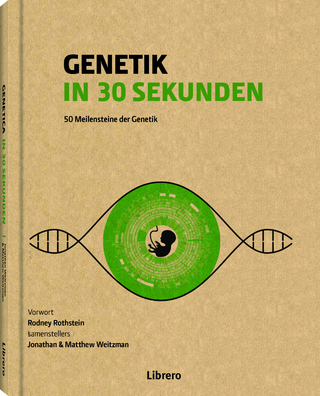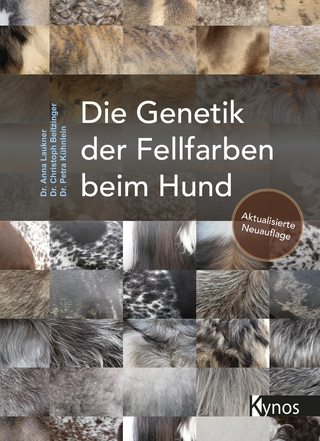
Introduction to Conservation Genetics
Cambridge University Press (Verlag)
978-0-521-63014-6 (ISBN)
- Titel erscheint in neuer Auflage
- Artikel merken
The biological diversity of our planet is being depleted due to the direct and indirect consequences of human activity. As the size of animal and plant populations decrease, loss of genetic diversity reduces their ability to adapt to changes in the environment, with inbreeding depression an inevitable consequence for many species. This textbook provides a clear and comprehensive introduction to the importance of genetic studies in conservation. The text is presented in an easy-to-follow format with main points and terms clearly highlighted. Each chapter concludes with a concise summary, which, together with worked examples and problems and answers, emphasise the key principles covered. Text boxes containing interesting case studies and other additional information enrich the content throughout, and over 100 beautiful pen and ink portraits of endangered species help bring the material to life.
Dick Frankham is Professor of Biology at Macquarie University, Sydney, Australia. He began his career in quantitative genetics, achieving international recognition for his work on Drosophila before turning to conservation genetics in the early 1990s. He has made a significant contribution to the establishment and advancement of the field and has become one of the major figures in the discipline. This has been recognised by his inclusion in '2000 Outstanding Scientists of the 21st Century'. Jon Ballou is Population Manager at the Smithsonian Institution's National Zoological Park in Washington DC, USA and an adjunct member of the faculty at the University of Maryland. His career has focused on developing the science underlying the practical management of small populations of endangered or threatened species, both captive and wild. The results of his studies have been instrumental in highlighting the key role played by genetics in wildlife conservation and management. David Briscoe is Associate Professor of Biology at Macquarie University, Sydney, Australia where he has been a close collaborator with Dick Frankham on Drosophila research, as well as working with others on rock wallabies, velvet worms and slime molds. An outstanding communicator, his inspirational teaching enthuses students at all levels and reaches beyond the academic sphere through television appearances and popular level books such as Biodiversity: Australia's Living Wealth to which he contributed.
Preface; Acknowledgements; 1. Introduction; 2. Genetics and extinction; Part I. Evolutionary Genetics of Natural Populations: 3. Genetic diversity; 4. Characterizing genetic diversity: single loci; 5. Characterizing genetic diversity: quantitative variation; 6. Evolution in large populations: natural selection and adaptation; 7. Evolution in large populations: mutation, migration and their interactions with selection; 8. Evolution in small populations; 9. Maintenance of genetic diversity; Part II. Effects of Population Size Reduction: 10. Loss of genetic diversity in small populations; 11. Inbreeding; 12. Inbreeding depression; 13. Population fragmentation; 14. Genetically viable populations; Part III. From Theory to Practice: 15. Resolving taxonomic uncertainties and defining management units; 16. Genetics and management of wild populations; 17. Genetic management of captive populations; 18. Genetic management for reintroduction; 19. Use of molecular genetics in forensics and to understand species biology; 20. The broader context: Population Viability Analysis (PVA); Take home messages from this book; Revision problems; Glossary; Answers to problems; References; Index.
| Erscheint lt. Verlag | 14.3.2002 |
|---|---|
| Illustrationen | Karina H. McInnes |
| Zusatzinfo | 47 Tables, unspecified; 8 Halftones, unspecified; 300 Line drawings, unspecified |
| Verlagsort | Cambridge |
| Sprache | englisch |
| Maße | 195 x 254 mm |
| Gewicht | 1598 g |
| Themenwelt | Naturwissenschaften ► Biologie ► Genetik / Molekularbiologie |
| Naturwissenschaften ► Biologie ► Ökologie / Naturschutz | |
| ISBN-10 | 0-521-63014-2 / 0521630142 |
| ISBN-13 | 978-0-521-63014-6 / 9780521630146 |
| Zustand | Neuware |
| Haben Sie eine Frage zum Produkt? |
aus dem Bereich



